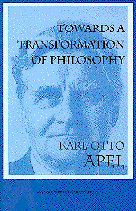20. Towards a Transformation of Philosophy, by Karl-Otto Apel. Translated by Glyn Adey and David Fisby. New Foreword by Pol Vandevelde. ISBN 0-87462-619-6. ©1998. Paperbound. Index. Bibliography. 308 pp. $35
Karl-Otto Apel has often been associated with Jürgen Habermas and, together, they have been considered to be the main representatives of critical theory. Although not entirely inaccurate, this characterization does not do justice to Apel’s specific project and it seems to have somewhat hampered the reception of his thought in the United States. The publication of two volumes of selected essays by the Humanities Press, edited by Eduardo Mendieta (Apel 1994, Apel 1996) as well as the present reprint of Towards a Transformation of Philosophy (Apel 1998) should contribute to the dissemination of his original theses and commentaries.
In 1973 Apel published a collection of articles and papers under the general title Transformation der Philosophie (Apel 1973). The texts are organized in two parts, each constituting a distinct volume. The first volume, subtitled Sprachanalytik, Semiotik, Hermeneutik, is dedicated to a discussion of how contemporary philosophy has been transformed by the emphasis put on language. The second volume, with the subtitle Das Apriori der Kommunikationsgemeinschaft more specifically presents Apel’s own transformation of philosophy by claiming for language analysis the status of a first philosophy as a foundation for any rational human enterprise. All of the texts reprinted in this volume are taken from the second volume, except the first one, “Wittgenstein and the Problem of Understanding,” which is taken from the first volume.
As Apel himself notes in his preface, the expression “Transformation of Philosophy” bears an ambiguity, naming both a change that took place in the development of philosophy as well as Apel’s own systematic project. As a historical approach the title characterizes the transformation that philosophy has undergone in 20th century philosophy through an emphasis on the mediation and the configuring power of language. Apel focuses on three main currents, represented by Wittgenstein, Heidegger, and Peirce. — From the new Foreword by Pol Vandevelde






